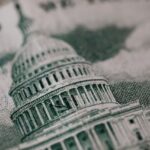In late Sept. 2020 when Amy Coney Barrett’s controversial nomination—and eventual appointment—to the Supreme Court was national news, James Grimaldi, a two-time Pulitzer-winning investigative journalist for The Wall Street Journal, was assigned to vet her finances.
He noticed right away that, while there were databases tracking finances for members of Congress, there wasn’t one for federal judges.
Grimaldi teamed up with the Free Law Project, an organization based out of Oakland, California, to build a comprehensive database of every financial filing for a federally appointed judge in the country.
“I knew immediately that we would have an opportunity to, for the first time, do an investigative piece on the financial disclosures of federal judges,” Grimaldi said. “We launched this project and we started looking to see if we could find conflicts and we were really, frankly, quite surprised to find as many conflicts as we did.”
They found, whether intentionally or not, that federal judges across the country have broken the law by hearing cases in which they’d had financial interests..
“We hold federal judges in some high esteem when we think that they’re reputable and honorable,” Grimaldi said. “And here they were violating really one of the most basic tenets of objectiveness and fairness by engaging in a conflict of interest.”
Grimaldi and his team, Coulter Jones and Joe Palazzolo, began filtering through massive amounts of data. It was difficult and tedious to compare the cases against the judges’ financial filings, he said. Jones handled the data, stored on an Amazon server they rented.
Jones would run queries to generate potential hits where a judge’s case would conflict with their stock holdings. But they quickly found the data they were working with had duplicates, misspellings, and other errors they had to find a way to work around.
For example, they’d get a hit that a judge was hearing a case about Johnson and Johnson. But, it could mean that it was Johnson versus Johnson, not J&J the pharmaceutical company, Grimaldi said.
It took them months to review every case every federal judge has heard and cross-check it with their financial holdings over the decades.
“It was both rewarding and grueling and time-consuming and frustrating,” he said. “But rewarding, because we were finding lots of conflicts of interest.”
Once they found so many judges were in violation of their responsibilities as appointed officials, Grimaldi and his team set out to speak to them directly. It was a difficult feat but Grimaldi said he was determined to confront judges about their conflicts of interest. Many of them, he found, had no idea they broke the law.
“I think a good percentage of them felt embarrassed and somewhat ashamed and apologetic for their oversight and realizing that they were creating an appearance problem for the court,” he said.
One of the best things that came from their reporting was the passage of the Court House Ethics and Transparency Act, which was passed shortly after the publication of their work. Within weeks, the House of Representatives held a hearing and within months, the bill was passed. In fact, Grimaldi said, before the House could finish drafting their bill, the Senate beat them to it. President Biden signed the bill in May of this year. From now on, the financial disclosures of federal judges will be made available to the public within six months of their filing.
“The greatest thing that has happened from this series is that we have been able to make judges a little bit more transparent, which I think will improve the efficiency of the federal courts and justice overall,” Grimaldi said.
–
Read the full series here.
Grimaldi and his team are now working on another—much larger—series, this time looking at the financial filings of federal officials.











